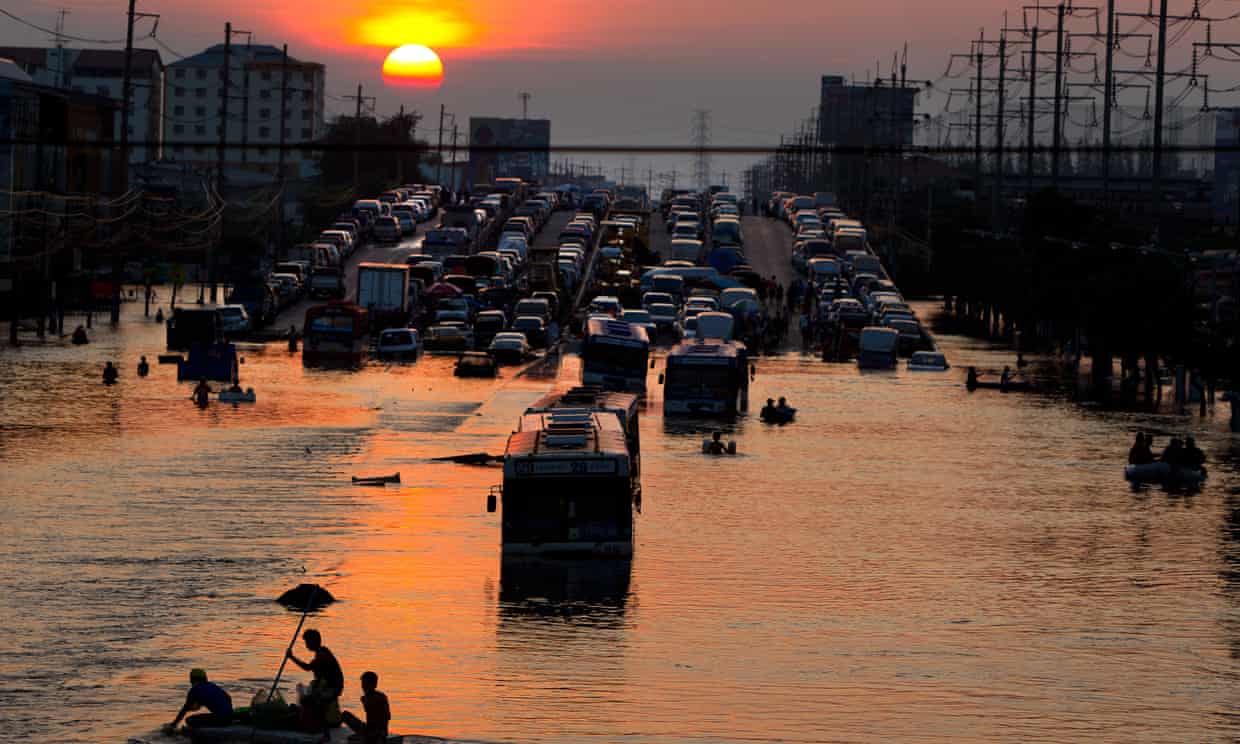The threat to major population centers is increasing as planners fail to prepare for impacts of global warming, report says

The cities named in the report are sinking for a variety of reasons. Jakarta is thought to be subsiding by 25cm a year largely because of groundwater extraction, and Houston is sinking as the oil wells beneath it are depleted. Bangkok’s skyscrapers are weighing it down, while London is slowly sinking for geological reasons: Scotland is slowly rebounding and rising after having been weighed down by glaciers during the last ice age, which is, in turn, pushing southern England downwards just like a see-saw.The warning comes as the world’s leading climate scientists meet this week in South Korea to finalize a comprehensive study setting out whether and how the world can avoid temperature rises of 1.5C above pre-industrial levels. The Intergovernmental Panel on Climate Change (IPCC), the body of scientists convened by the UN, has been asked to examine the consequences of such a rise and assess what progress can be made to limit greenhouse gas emissions.
The world has already warmed by roughly 1C from pre-industrial levels, and sea levels could rise by 40cm if that increases to 1.5C, previous science from the IPCC has suggested. Sharp brakes on greenhouse gas production are expected to be needed to halt the rise.
Under the 2015 Paris agreement on climate change, governments pledged to hold warming to no more than 2C, with an aspiration not to surpass 1.5C, based on previous IPCC advice. The new IPCC report, to be published on Monday, is expected to show that remaining within the 1.5C limit is still possible but only with strong action to reduce carbon in the atmosphere.
Christian Aid, one of many organizations publishing studies to coincide with the IPCC’s judgment, looked at the consequences of a 1.5C rise for a selection of eight major cities around the world. The report concludes that poor development choices are exacerbating cities’ vulnerability to weather shocks. They should plan city development around preparing for future flooding.
Kat Kramer of Christian Aid, who wrote the report, said: “These global metropolises may look strong and stable, but it is a mirage. As sea levels rise, they are increasingly under threat and under water.”
Dozens of the world’s biggest cities are built in coastal areas and near major rivers, making them vulnerable not just to sea level rises but also to storm surges, which can send high seas inland and past maritime defenses.
The UK and the Netherlands experienced such a storm in 1953, when high tides and a storm surge inundated coastal regions. If similar weather were to strike today, the damage could be much greater despite sea defences, because of rising sea levels and the increased severity of storms that is likely to result from climate change. It is a fact most of the largest cities in the world are close to the sea or great rivers for ease of shipping commerce and trade with other countries. Also for fishing industries, tourist industries and many more industries dependent on water. Now we know that sea walls are not adequate to hold back the angry oceans and eventually our biggest cities will be gone like Atlantis unless our engineers put their knowledge to work to protect them.

ReplyDeleteAunt Jeannie ,
The forecast is that all the coastal cities is disappearing and I believe it to be true , we went to N.O. about 2 or 3 months ago they live in the low lying areas near the swampland , some had home on stilts .
I notice most people with knowledge and know how just drag their feet thinking if the ignore the problem it will go away , not so .I truly hope a lot of people read this post .
Love
Crusader , Nanook & Knight Mika
You are so right Crusader. People think the problems will solve themselves or somebody else will solve them ...so they don't have to do anything. It's a shame they keep constructing houses and buildings in the same old way and not prepared for flooding. The people in NO with houses on stilts have the right idea. But they really should consider moving further inland. They will be forced to in a few years anyway.
DeleteIf we can wake just a few people up Crusader, then we have done a good thing. And they will teach a few more.
Love
Knight Aunt Jeannie
Knight Mika sends her love too( she chews on her plastic sword)
October 5, 2018
ReplyDeleteToday---------25
Yesterday-----15
This month----60
Total-------- 6,139
JLC
October 6,2018
ReplyDeleteToday-----------8
Yesterday------28
This month-----71
Total-------------6,150
JLC